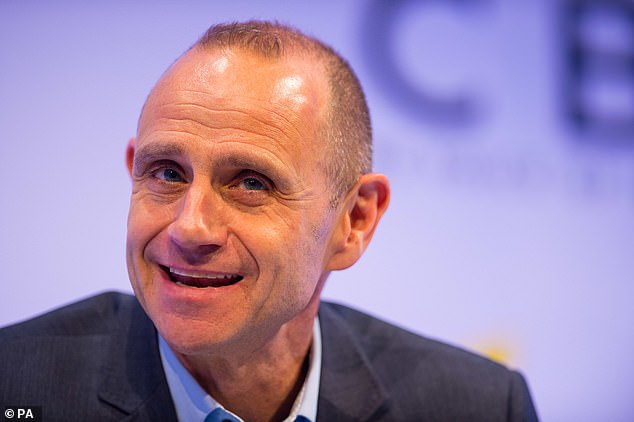The BBC has banned Evan Davis from hosting his new podcast on heat pumps over fears it is a controversial topic.
The Dragons Den presenter, 63, announced the independent podcast in December, describing it as a podcast ‘about anything and everything to do with heat pumps’.
But the former Newsnight host confirmed that the 20th episode, released this week would be its last.
He said: ‘Sorry to say, that after about 20 episodes, we’re drawing it to a close at the request of the BBC which worries it may be seen as steering into areas of public controversy.’
He added: ‘The BBC legitimately regulates its presenters’ external activities. And for good reason, they like us to avoid stepping into live arguments.’
The BBC had initially given its approval to go ahead with the non-BBC project, but bosses have now told Davis the podcast risked exposing him to accusations of political bias.
‘As the series has gone on – in fact as the world has progressed over the last few months – they have become concerned that anything like this trying to inform people about heat pumps can be interpreted, rightly or wrongly, as somehow treading on areas of public controversy,’ he told followers of the podcast’s YouTube channel.
‘I take their shilling, they dictate the rules. They have to try and keep their presenters out of areas of public controversy, and they have decided heat pumps can be controversial, so they’ve asked me not to be involved.’
The BBC has banned Evan Davis from hosting his new podcast on heat pumps over fears it is a controversial topic

The Dragons Den presenter, 63, announced the independent podcast in December, describing it as a podcast ‘about anything and everything to do with heat pumps’

An air source heat pump unit is installed into a 1930s built house in Folkestone, Kent, in 2021
Davis received no remuneration for the podcast and had personally paid its small costs for music and audio recording equipment.
Fans of the podcast were quick to lambast the decision of the corporation to force Evans to step down from his ‘side hustle’.
One said: ‘This is sad news, that the BBC seems to be scared of its own shadow.’
Another said: ‘That’s not good. Every area has the potential for public controversy.’
One asked: ‘Are there any other technologies whose existence is going to be banned by their beebships?’
One joked: ‘You don’t want to fuel any controversy. Then again, with a heat pump you won’t be fuelling anything in the first place.’
Heat pumps run on electricity instead of gas, and warm buildings by absorbing and amplifying heat from the air, ground, or water.
They are more efficient than gas boilers and can use electricity generated from increasingly clean sources, as wind and solar power replace polluting fossil fuels.
But have courted controversy for the high cost of installing and running heat pumps and accusations that some models do not produce enough heat.
The podcast is aimed primarily at consumers who are thinking about installing a heat pump, and episodes covered topics such as what a heat pump is, how it works, how to use one, and how much it costs to install.
It came ahead of new 2025 rules, which mandate that all new homes built in the UK will be required to have a low-carbon heating system, typically a heat pump.
Davis’s cohost on the podcast is Bean Beanland, the Director for Growth and External Affairs for the Heat Pump Federation, the leading lobby group for the green technology. He described the decision by the BBC as ‘quite extraordinary’.
The show came about after the duo met a couple of times at events. For Evan, it’s a topic he’s interested in and wanted to explore, so the podcast largely takes the format of Evan posing questions to Bean as a heat pump aficionado.
During the introduction to the first episode, Evan explained: ‘This is a side hustle, nothing to do with my employer. It’s a hobby. Joining me in the series is the great Bean Beanland. He knows as much about heat pumps as anyone in the country.’
A BBC spokesperson told the Mail: ‘The BBC editorial guidelines are clear that anyone working for the BBC who does an external public speaking or writing engagement should not compromise the impartiality or integrity of the BBC or its content, or suggest that any part of the BBC endorses a third-party organisation, product, service or campaign.’


Air-source heating pumps are seen as a key feature of the government’s net-zero plans, with 18 per cent of the nation’s greenhouse emissions coming from heating homes in 2021
One BBC source said that Davis’s podcast only explored and promoted one possible solution to climate change.
Air-source heating pumps are seen as a key feature of the government’s net-zero plans, with 18 per cent of the nation’s greenhouse emissions coming from heating homes in 2021.
However, take up of the eco-friendly systems has lagged far behind estimations, with just 18,900 homeowners purchasing the pumps under the government’s grant scheme between May 2022 and May 2023.
The two principal factors in this slow uptake have been identified as rising energy costs and a general lack of awareness around the technology.
Although heat pumps are significantly more efficient than boilers, electricity prices are much higher than gas, meaning that the air-source pump systems have proven a more costly heating method than traditional boilers.
Moreover, a 2024 survey found that over 30 per cent of Brits were not even aware of the technology or even the government’s net-zero initiative itself.
Just last week, Labour were forced to ditch plans to ban the sale of new gas boilers by 2035 as result of the slow implementation and skepticism surrounding air-source heat pumps.


